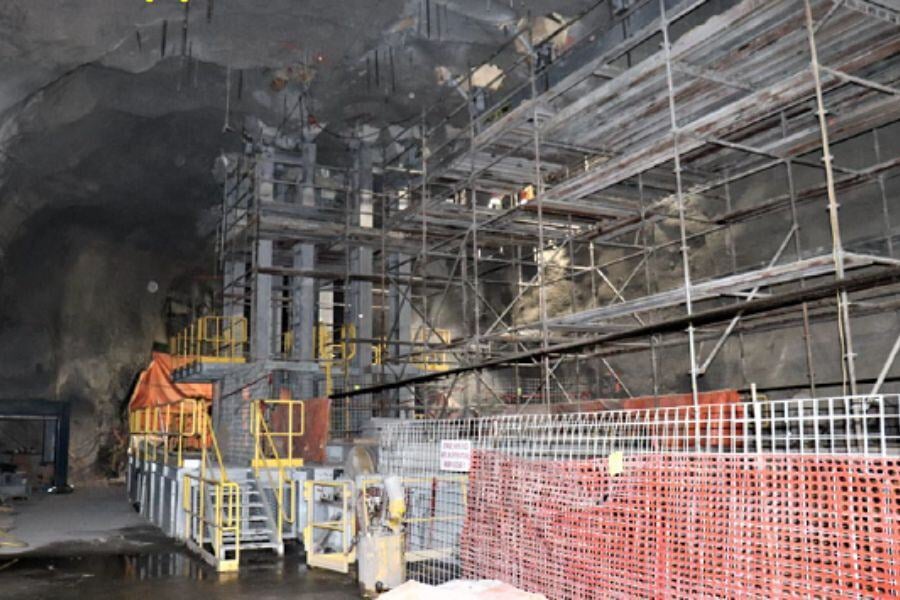
Onaping Depth Nickel Project
The Sudbury Basin has long been central to Canada’s mining industry, contributing greatly to the economy and the global supply of critical minerals. The Onaping Depth Nickel Project, spearheaded by Glencore, began its development phase in 2017, with construction and related activities ramping up shortly thereafter. The project has a target completion date of 2025, when full-scale production is expected to commence. These timelines align with Glencore’s strategic goals to meet the growing demand for critical minerals like nickel, essential for clean energy technologies.
Deep Collaboration for Deep Mining
At its heart, the Onaping Depth Project is about more than mining. It is a partnership that brings together Glencore, Indigenous communities, and experts in engineering and sustainability. Working closely with the Sagamok Anishnawbek First Nation, Atikameksheng Anishnawbek First Nation, and the Métis Nation of Ontario, the project combines economic development with cultural respect and environmental care.
Project Details
With an investment of $700 million, this ambitious initiative is designed to:
- Extract high-quality nickel and copper to meet the increasing demand for clean energy technologies such as electric vehicles and renewable energy storage.
- Set new benchmarks for safety, innovation, and environmental responsibility in the mining industry.
- Promote economic growth by creating jobs and supporting local businesses, with a focus on Indigenous employment and procurement opportunities.
Challenges
The project has faced a range of challenges, from technical and environmental concerns to ensuring respect for Indigenous rights and traditions:
Technical and Safety Challenges
Mining at extreme depths comes with significant risks, including:
- High stress on rock structures, increasing the chance of seismic events.
- The need for advanced systems to maintain safety in challenging underground conditions, such as extreme heat and limited ventilation.
Environmental and Cultural Sensitivity
Operating within traditional Indigenous territories requires careful planning to:
- Protect cultural sites and traditional land uses.
- Minimise the impact on local wildlife, waterways, and ecosystems.
Regulatory Demands
Meeting strict environmental, social, and governance (ESG) standards requires innovative approaches and transparency in all operations.
Innovative Solutions
To address these challenges, the Onaping Depth Project has adopted a range of innovative and inclusive strategies:
Advanced Technology for Safety
- Geotechnical Monitoring: Real-time monitoring systems track rock stability to ensure worker safety and prevent accidents.
- Specialist Ventilation Systems: Advanced ventilation maintains safe air quality at great depths.
- Electric Vehicles: Switching to electric equipment reduces emissions underground.
Indigenous Collaboration
- Impact and Benefit Agreements (IBAs): These agreements outline shared goals, including job creation, revenue sharing, and protections for cultural heritage.
- Traditional Knowledge Integration: Indigenous ecological knowledge has been incorporated into environmental planning to safeguard local ecosystems.
- Community Consultations: Regular meetings with Indigenous leaders ensure the project respects cultural values and addresses concerns.
Sustainable Practices
- Water Management Systems: Advanced designs reduce water use and protect nearby ecosystems from contamination.
- Land Restoration Plans: Commitments to reclaim and restore land after mining operations demonstrate long-term care for the environment.
The Importance of Indigenous Partnerships
Collaboration with Indigenous communities has been integral to the success of the Onaping Depth Project. Glencore has worked to ensure that the benefits of the project are shared fairly, while respecting the cultural significance of the land. Key efforts include:
Economic Opportunities
- Indigenous workers have been prioritised in recruitment efforts, with tailored training programmes to support long-term careers in mining.
- Local Indigenous businesses have secured contracts for procurement, boosting community incomes.
Cultural Respect
- Sacred sites and traditional practices have been protected through ongoing consultation with Indigenous Elders and leaders.
- Staff working on the project undergo cultural awareness training to better understand and respect Indigenous traditions.
Environmental Stewardship
- Indigenous ecological knowledge has informed practices to reduce the project’s impact on wildlife, water, and forests.
- Collaboration has ensured that the project aligns with Indigenous values of sustainability and care for the natural world.
Outcomes and Benefits
The Onaping Depth Project has already delivered significant results:
Economic Growth
- The project has created over 1,000 jobs during its construction phase, with many roles filled by Indigenous workers.
- Local businesses, particularly those owned by Indigenous people, have benefitted from procurement contracts and other economic opportunities.
Innovation in Mining
- New techniques for deep mining, such as advanced ventilation and seismic monitoring, have set industry standards.
- The use of electric vehicles underground has significantly reduced carbon emissions.
Stronger Relationships
- Trust between Glencore and Indigenous communities has deepened through shared decision-making and regular dialogue.
- These partnerships serve as a model for future collaborations in the resource sector.
Long-Term Commitments
The success of the Onaping Depth Project lies not just in its immediate achievements, but also in its plans for the future:
Continuing Indigenous Engagement
- Regular consultations will ensure that Indigenous communities remain involved throughout the life of the project.
- New opportunities for training, employment, and community development will be explored as the project progresses.
Environmental Responsibility
- Plans for land reclamation and ecosystem restoration are already underway, ensuring that the impact of mining is minimised in the long term.
- Continuous investment in cleaner, greener technologies will further reduce environmental harm.
Transparent Reporting
- Regular updates on progress, environmental performance, and community benefits will maintain accountability and trust.
The Onaping Depth Nickel Project represents a new chapter in Canadian mining, one that balances technological innovation with social and environmental responsibility. By prioritising partnerships with Indigenous communities, Glencore has shown how resource development can be both inclusive and sustainable.
This project not only meets the growing demand for critical minerals but also sets a benchmark for collaboration and respect. It stands as an example of how businesses can work together with Indigenous peoples to achieve shared prosperity while protecting cultural heritage and the environment.

Don’t miss an episode – Subscribe to our podcast!
Listen to invaluable insights from industry leaders. Join our podcast to delve deeper into the world of Indigenous communities, investments, and more. Don't miss an episode - follow our podcast today.
Don’t miss an episode – Subscribe to our podcast!
Listen to invaluable insights from industry leaders. Join our podcast, Drumbeats, to delve deeper into the world of Indigenous communities, investments, and more. Don't miss an episode - follow our podcast today.




